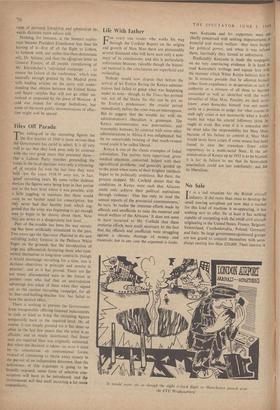Life With Father
FOR every one reader who works his way through the Corfield Report on the origins and growth of Mau Mau there are presuniably several thousand who will have seen only a sum- mary of its conclusions; and this is particularly unfortunate because, valuable though the histori- cal material is, the conclusions are superficial and misleading.
Nobody would now dispute that before the arrival of Sir Evelyn Baring the Kenya adminis- tration had failed to grasp what was happening under its nose—though. as the Time.% has pointed out, not all the blame for this can be put on Sir Evelyn's predecessor; the crucial period immediately before the crisis was an interregnum. But to suggest that the trouble lay with . the administration's liberalism is grotesque. The Kenya administration was paternalistic, and reasonably humane; by contrast with some other administrations in Africa it was enlightened; but by no conceivable twisting of that much-twisted word could it be called liberal.
Kenya is one of the classic examples of failed colonialism. The natives were supervised, given medical attention, converted, helped with their agricultural problems; and generally guided up to the point when some of their brighter intellects began to be politically ambitious. But there, the process stopped. Mr. Corfield denies that the conditions in Kenya were such that Africans could only . achieve their political aspirations through violence: 'One has only to read the annual reports of the provincial commissioners,' he says, `to realise the immense efforts made by officials and• unofficials to raise the material and moral welfare of the Africans.' It does not seem to have 'occurred to M. Cotfield that these imnicnse efforts were made necessary by the fact that the, officials and unofficials were struggling against a chronic shortage of money and materials; but in any case the argument is irrele-
'It would seen:, sir. as though the eight o'clock flight to Manchester' passed over the ETU HeadquarterS.' vant. Kenyatta and his supporters were not chiefly concerned with seeking improvements M material and moral welfare: they were hungry for political power, and when it was refused them, inevitably they turned to subversion.
Predictably Kenyatta is made the scapegoat. on no very convincing evidence. It is hard to read Kenyatta's writings and equate him %Oh the monster which White Kenya believes him to be. It remains possible that he allowed himself either from expediency or desperation or lack of authority or a mixture of all three to become associated as well as identified with the orst atrocities of Mau Mau. Possibly we shall noer know: even Kenyatta himself was not neces- sarily in a position to judge. for what counts M such ugly crises is not necessarily what a leader wants but what his crazed followers think he ought to want. But even if it is conceded that he must take the responsibility for Mau Nlau, because of his failure to control it, Mau Mau would never have arisen if some means had been found to ease the transition from white supremacy to a multi-racial State. If the ad- ministration of Kenya up to 1952 is to be blamed, it is for its failure to see that its benevolent paternalism could not last indefinitely; not for its liberalism.


































 Previous page
Previous page